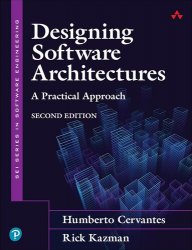Designing Software Architectures: A Practical Approach, 2nd Edition (Final)
- Добавил: literator
- Дата: 28-05-2024, 06:47
- Комментариев: 0
 Название: Designing Software Architectures: A Practical Approach, 2nd Edition (Final)
Название: Designing Software Architectures: A Practical Approach, 2nd Edition (Final)Автор: Humberto Cervantes, Rick Kazman
Издательство: Addison-Wesley Professional/Pearson Education
Год: 2024
Страниц: 455
Язык: английский
Формат: pdf (true)
Размер: 39.7 MB
Learn how to create successful architectural designs and improve your current design practices!
Designing Software Architectures, 2nd Edition, provides a practical, step-by-step methodology for architecture design that any professional software engineer can use, with structured methods supported by reusable chunks of design knowledge and rich case studies that demonstrate how to use the methods.
The Attribute-Driven Design method may not have changed since this book's first printing, but almost everything else about the industry has. In this newly updated edition, you will find new chapters on supporting business agility through API-centric design, deployability, cloud-based solutions, and technical debt in design.
Humberto Cervantes and Rick Kazman illuminate best practices for how architects should design complex systems so you can make design decisions in systematic, repeatable, and cost-effective ways. This book will help you become a better, more confident designer who can create high-quality architectures with ease.
In the Chapter 1 we provide an introduction to the topic of software architecture and architecture design. We briefly discuss what architecture is and why it is fundamental to take it into account when developing software systems. We also discuss the activities that are associated with the development of software architecture so that architectural design—which is the primary topic of this book—can be understood in the context of these activities. We also briefly discuss the role of the architect, who is the person responsible for creating the design. Finally, we introduce the Attribute-Driven Design (ADD) method, the architecture design method that we will discuss extensively in this book.
We now present an extended design example of using ADD in a greenfield system for an emerging domain, that of digital twins in an Industry 4.0 context. At the time of writing, this domain was still relatively new and rapidly evolving. This domain requires a combination of multiple disciplines such as the Internet of Things (IoT), cloud computing, Big Data and analytics, artificial intelligence/machine learning (AI/ML), extended reality (XR), simulation, advanced automation, and often robotics. Such a vast number of domains is beyond the expertise of a single architect, and this case study exemplifies how a team of architects from different disciplines can participate in the design of a system. Here, none of the architects can solely rely on their experience alone to guide them. Instead, they have to cooperate and leverage design concepts and best practices from each discipline.
The new edition includes:
A clear explanation of the Attribute-Driven Design method
New chapters focused on the technical environments and contexts of contemporary design
Two new case studies on The Hotel Pricing System and Digital Twin Platform
Coverage of current architecture topics like cloud computing, DevOps, and large-scale systems
Methods to make architecture design agile and achievable
Скачать Designing Software Architectures: A Practical Approach, 2nd Edition (Final)
Внимание
Уважаемый посетитель, Вы зашли на сайт как незарегистрированный пользователь.
Мы рекомендуем Вам зарегистрироваться либо войти на сайт под своим именем.
Уважаемый посетитель, Вы зашли на сайт как незарегистрированный пользователь.
Мы рекомендуем Вам зарегистрироваться либо войти на сайт под своим именем.
Информация
Посетители, находящиеся в группе Гости, не могут оставлять комментарии к данной публикации.
Посетители, находящиеся в группе Гости, не могут оставлять комментарии к данной публикации.
